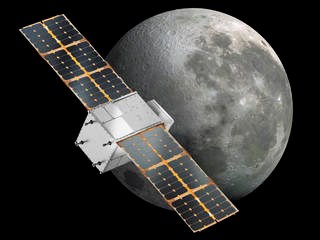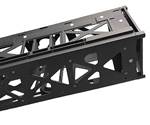Rocket Launch awarded NASA contract for lunar CubeSat launch
The CAPSTONE CubeSat is scheduled for launch from Virginia, U.S. in 2021.

Rendering of the CAPSTONE CubeSat. Source | NASA
NASA has selected Rocket Lab (Huntington Beach, Calif., U.S.) to provide launch services for the Cislunar Autonomous Positioning System Technology Operations and Navigation Experiment () CubeSat.
Rocket Lab, a commercial launch provider licensed by the Federal Aviation Administration (FAA), will launch the 55-pound CubeSat aboard an Electron rocket from NASA’s Wallops Flight Facility in Virginia. After launch, the company’s Photon platform will deliver CAPSTONE to a trans-lunar injection. The engine firing will allow the CubeSat to break free of Earth’s gravity and head to the moon. Then, CAPSTONE will use its own propulsion system to enter a cislunar orbit, which is the orbital area near and around the moon.
The mission is targeted for launch in early 2021.
“This mission is all about quickly and more affordably demonstrating new capabilities, and we are partnering with small businesses to do it,” says Christopher Baker, Small Spacecraft Technology program executive at the agency’s headquarters in Washington.
Following a three-month trip to the moon, CAPSTONE will enter a near rectilinear halo orbit, which is a highly elliptical orbit over the moon’s poles, to verify its characteristics for future missions and conduct a navigation demonstration with NASA’s Lunar Reconnaissance Orbiter. CAPSTONE will serve as a pathfinder for the lunar spaceship , a key component of NASA’s program.
“CAPSTONE is a rapid, risk-tolerant demonstration that sets out to learn about the unique, seven-day cislunar orbit we are also targeting for Gateway,” says Marshall Smith, director of human lunar exploration programs at NASA Headquarters. “We are not relying only on this precursor data, but we can reduce navigation uncertainties ahead of our future missions using the same lunar orbit.”
The firm-fixed-price launch contract is valued at $9.95 million. In September, NASA awarded a $13.7 million contract to Advanced Space of Boulder, Colo., to develop and operate the CubeSat.
After a final design review this month, Advanced Space and Tyvak Nano-Satellite Systems Inc. (Irvine, Calif., U.S.), will start building and testing the spacecraft.
CAPSTONE is managed by NASA’s Small Spacecraft Technology program within the agency’s Space Technology Mission Directorate. Advanced Exploration Systems within NASA’s Human Exploration and Operations Mission Directorate supports the launch and mission operations.
Related Content
-
Plant tour: Aernnova Composites, Toledo and Illescas, Spain
RTM and ATL/AFP high-rate production sites feature this composites and engineering leader’s continued push for excellence and innovation for future airframes.
-
The potential for thermoplastic composite nacelles
Collins Aerospace draws on global team, decades of experience to demonstrate large, curved AFP and welded structures for the next generation of aircraft.
-
First Airbus A350 crash confirmed in Haneda
Shortly after touch-down, a JAL A350-900 aircraft recently collided with a De Havilland Canada Dash 8. Exact circumstances are still unknown.
.jpg;width=70;height=70;mode=crop)





